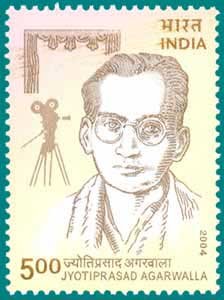Jyotiprasad Agarwalla (1903-1951)

Technical Data
| Date of Issue | June 17, 2004 |
|---|---|
| Denomination | Rs. 5 |
| Quantity | 400,000 |
| Perforation | comb 13 x 13½ |
| Printer | Security Printing Press, Nashik |
| Watermark | No Watermark |
| Colors | Multicolor |
| Catalog Codes |
Michel IN 2027 Stamp Number IN 2063 Yvert et Tellier IN 1792 Stanley Gibbons IN 2205 WADP Numbering System - WNS IN013.04 |
| Themes | Anniversaries and Jubilees | Famous people | Literary People (Poets and Writers) | Men | Movies | Optical Instruments |
Table of Contents
Jyotiprasad Agarwalla: A Cultural Icon and Nationalist
Jyotiprasad Agarwalla, born on June 17, 1903, to Parmananda Agarwalla and Kiranmoyee Devi, was a multifaceted cultural icon, nationalist, musician, poet, and humanist. His belief that “man derives supreme happiness in life by the complete propagation of culture” shaped his life and work, reflecting his commitment to the cultural and national identity of Assam.
Early Life and Education
Agarwalla’s early education took place at Tezpur High School and later at Chittranjan Das University and National College Calcutta. His patriotism ignited during Gandhiji’s visit to Tezpur in 1921, leading him to become an active participant in the Satyagraha movement throughout the 1930s. His passion for music and culture was nurtured in the artistic environment of Tezpur and influenced by his music-loving father.
Nationalist Activities
Agarwalla’s nationalism manifested through his prolific songwriting, as he composed numerous patriotic songs that inspired the youth. In 1932, he faced arrest and was fined for his activities. He married Debajani Bhuyan in 1936 and continued his revolutionary work during the Quit India movement, where he led a volunteer force underground. Following Gandhiji’s advice, he surrendered to the British on August 15, 1943, and was tried but released due to lack of evidence.
Artistic Contributions
Agarwalla’s artistic talents flourished early in life. At just 14 years old, he penned the musical dance drama “Shonit Kunwari,” combining Bihu and Bhawna dance forms, which became a milestone in Assamese drama when staged in 1924. His notable works include Karingarligiri, Rupalim, Labhita, and Nimati Kanya. A prolific poet, he utilized rich Assamese language in his writings, including “Jyoti Ramayana,” a significant contribution to children’s literature. He also created “Jyoti Sangeet,” blending Assamese, Hindustani, and Western music styles.
Innovations in Film and Theatre
In 1926, Agarwalla left India for Edinburgh University and was influenced by contemporary trends in music and drama. He studied cinematography in Berlin in 1929 and later returned to India to direct “Joymati,” Assam’s first film and a landmark talkie in the silent film era, released on March 10, 1935. His innovations extended to establishing Chitraban, the first film studio, Jonaki, the first theatre, and Tezpur Sangeet Mahavidyalaya. He also made the first gramophone records of his plays alongside notable figures like Shri Bishnu Prasad Rabha.
Legacy and Impact
Agarwalla dedicated his life to rejuvenating Assamese society, advocating for unity among the region’s diverse ethnic groups. He championed the empowerment of the masses as a path to cultural change and fought for Assamese to be recognized as the official language. His efforts contributed to the establishment of Guwahati University, among other initiatives.
Affectionately known as “Rupkonwar,” or the “Prince of Beauty,” for his contributions to Assamese literature, music, and culture, Jyotiprasad Agarwalla passed away on January 17, 1951. This day is commemorated as ‘Silpi Diwas’ in Assam, honoring his legacy. In recognition of his contributions, the Department of Posts has released a commemorative stamp, celebrating the life and achievements of this remarkable cultural figure.
